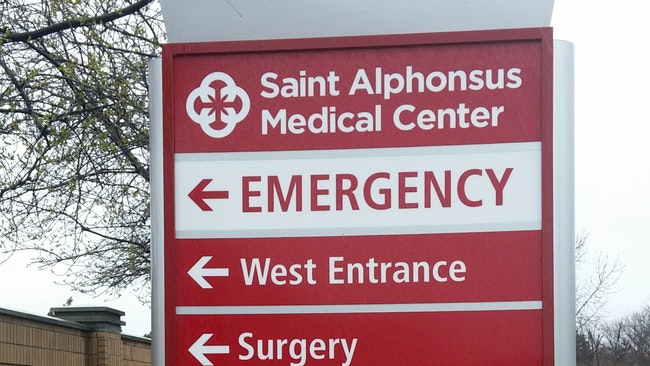
NOTE: The Malheur Enterprise is providing free access to its content related to the coronavirus as a community service. Subscriptions help support this.
As the pandemic continues to spread, the region’s hospitals are bracing for the unthinkable – picking who gets medical care and who goes without.
St. Luke’s Health System, with operations in Fruitland, anticipates having to ration medical services by the end of the year. Saint Alphonsus Health System, which includes the hospital in Ontario, is anticipating rationing services in January.
“We are beyond the point where we’re able to deliver normal standards of care,” said Dr. Steve Nemerson, Saint Alphonsus chief clinical officer.
Nemerson and Dr. Jim Souza, St. Luke’s chief medical officer, shared an unsparing account of circumstances in the region’s medical system to the board of Idaho’s Central District Health on Friday.
The two doctors described an increasing shortage of medical staff, growing patient caseloads, and weariness of health care workers trying to keep up.
“Our staff are beginning to fall to the side,” Emerson said. “They’ve exhausted their endurance.”
Nemerson told how he is now taking calls and getting video messages from colleagues in the middle of the night to discuss patient care.
He said an increasing number of Saint Alphonsus employees are on leave due to Covid. Two months ago, Saint Alphonsus had 20 employees out on Covid leave.
“Now, we have 140,” Nemerson said, adding that it puts an “enormous strain” on the remaining staff.
“As the growth in Covid occurs in the community, the growth in Covid among our employees also will increase at an exponential rate,” Nemerson said.
He said that two months ago, Saint Alphonsus had 10 Covid patients hospitalized across its system. The patient count now ranges from 70 to 90.
The rate of positive Covid tests two months ago was 7%, he said, but the rate is now between 25% and 30%. He said anything over 5% means the pandemic is out of control.
“I don’t know what you call it when it’s greater than 25% – a forest fire or something,” Nemerson said.
He said Saint Alphonsus has been converting some clinical space into hospital space to handle more patients and could resort to converting classrooms and conference rooms into treatment rooms. Asked about establishing temporary field hospitals, Nemerson said there is no staff for such facilities.
Nemerson explained that Saint Alphonsus is part of Trinity Health, a Michigan-based company which cares for 30 million people across 22 states and operates 92 hospitals. He said none have nurses to spare, so “we have looked at nurses from other countries.”
Nemerson and Souza said the hospital systems are modifying their operations to try to keep up with surging caseloads. Nemerson said nurses are taking on more patients than normal, which means that a patient’s call button might not be answered as quickly.
He described how treatment of a cancer patient could degrade as the system fills. He said a patient with Stage 1 cancer might now be told “we can’t take that out tomorrow as we normally would have done” and that the patient might be No. 27 in line for care.
He said a delay of a week or two might stretch longer, and that a tumor can advance to where a patient’s chance of survival is 1 in 4. He said if hospitals get to the point that Covid patients are lining the hallways, the cancer patient may be told “you just have to keep the tumor inside your body and we’ll do the best we can.”
The doctors said that the patterns of spreading Covid, if left unchecked, could force hospitals to go to crisis care, possibly in a matter of weeks. They said such a critical level would force medical providers to select which patients get care and, Nemerson said, “literally have to turn patients away.”
“I don’t want to panic the public,” Nemerson said. “This is very, very alarming to hear the information we are sharing.”
Souza emphasized that the illnesses and deaths from Covid are preventable, and that the public holds the key to stopping the hospitals from having to limit care.
Nemerson and Souza said the public can also help by supporting medical workers, who are taking on extra shifts and working without breaks.
“Tell them thanks,” Nemerson said.
“They need to know that their work is valued,” Souza said. “It’s demoralizing beyond belief when they’re faced with what almost feels like a parallel universe that you’re somehow doing something that’s wrong or making up stories about a hoax.”
He said the doctors, nurses and other providers are the ones who have cared for the people in the community from birth. He pleaded for public support.
“None of these people are part of a conspiracy,” he said.
HOLIDAY SPECIAL: Get a full year of access to the digital service of the Malheur Enterprise at a 25% savings. No news organization can match our quality and depth of coverage of Malheur County. This is a limited time offer you can get HERE.




